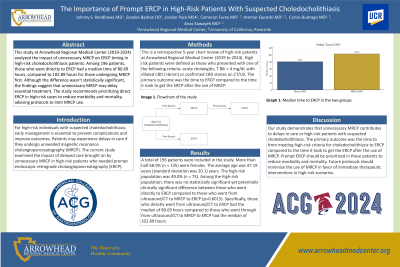Sunday Poster Session
Category: Interventional Endoscopy
P1041 - The Importance of Prompt ERCP in High-Risk Patients With Suspected Choledocholithiasis
Sunday, October 27, 2024
3:30 PM - 7:00 PM ET
Location: Exhibit Hall E

Has Audio

Johnny S. Randhawa, MD
Arrowhead Regional Medical Center
Sanger, CA
Presenting Author(s)
Johnny S. Randhawa, MD1, Sondos Badran, DO1, Jordan Pace, MS2, Cameron Furey, MD3, Ammar Qureshi, MD3, Carlos Buitrago, MD3, Anas Kawayeh, MD4
1Arrowhead Regional Medical Center, Sanger, CA; 2California University of Science and Medicine, Redlands, CA; 3University of California Riverside School of Medicine, Riverside, CA; 4HCA Riverside Community Hospital, Riverside, CA
Introduction: For high-risk individuals with suspected choledocholithiasis, early management is essential to prevent complications and improve outcomes. Patients may experience delays in care if they undergo unneeded magnetic resonance cholangiopancreatography (MRCP). The current study examined the impact of delayed care brought on by unnecessary MRCP in high-risk patients who needed prompt endoscopic retrograde cholangiopancreatography (ERCP).
Methods: This is a retrospective 5-year chart review of high-risk patients at Arrowhead Regional Medical Center (2019 to 2024). High risk patients were defined as those who presented with one of the following criteria: acute cholangitis, T Bili > 4 mg/dL with dilated CBD ( >6mm) or confirmed CBD stones on CT/US. The primary outcome was the time to ERCP compared to the time it took to get the ERCP after the use of MRCP.
Results: A total of 196 patients were included in the study. More than half 68.9% (n = 135) were females). The average age was 47.19 years (standard deviation was 20.1) years. The high-risk population was 49.0% (n = 73). Among the high-risk population, there was no statistically significant yet potentially clinically significant difference between those who went directly to ERCP compared to those who went from ultrasound/CT to MRCP to ERCP (p=0.6015). Specifically, those who directly went from ultrasound/CT to ERCP had the median of 80.69 hours compared to those who went through from ultrasound/CT to MRCP to ERCP had the median of 102.89 hours.
Discussion: Our study demonstrates that unnecessary MRCP contributes to delays in care for high-risk patients with suspected choledocholithiasis. The primary outcome was the time to from meeting high-risk criteria for choledocholithiasis to ERCP compared to the time it took to get the ERCP after the use of MRCP. Prompt ERCP should be prioritized in these patients to reduce morbidity and mortality. Future protocols should minimize the use of MRCP in favor of immediate therapeutic interventions in high-risk scenarios.
Disclosures:
Johnny S. Randhawa, MD1, Sondos Badran, DO1, Jordan Pace, MS2, Cameron Furey, MD3, Ammar Qureshi, MD3, Carlos Buitrago, MD3, Anas Kawayeh, MD4. P1041 - The Importance of Prompt ERCP in High-Risk Patients With Suspected Choledocholithiasis, ACG 2024 Annual Scientific Meeting Abstracts. Philadelphia, PA: American College of Gastroenterology.
1Arrowhead Regional Medical Center, Sanger, CA; 2California University of Science and Medicine, Redlands, CA; 3University of California Riverside School of Medicine, Riverside, CA; 4HCA Riverside Community Hospital, Riverside, CA
Introduction: For high-risk individuals with suspected choledocholithiasis, early management is essential to prevent complications and improve outcomes. Patients may experience delays in care if they undergo unneeded magnetic resonance cholangiopancreatography (MRCP). The current study examined the impact of delayed care brought on by unnecessary MRCP in high-risk patients who needed prompt endoscopic retrograde cholangiopancreatography (ERCP).
Methods: This is a retrospective 5-year chart review of high-risk patients at Arrowhead Regional Medical Center (2019 to 2024). High risk patients were defined as those who presented with one of the following criteria: acute cholangitis, T Bili > 4 mg/dL with dilated CBD ( >6mm) or confirmed CBD stones on CT/US. The primary outcome was the time to ERCP compared to the time it took to get the ERCP after the use of MRCP.
Results: A total of 196 patients were included in the study. More than half 68.9% (n = 135) were females). The average age was 47.19 years (standard deviation was 20.1) years. The high-risk population was 49.0% (n = 73). Among the high-risk population, there was no statistically significant yet potentially clinically significant difference between those who went directly to ERCP compared to those who went from ultrasound/CT to MRCP to ERCP (p=0.6015). Specifically, those who directly went from ultrasound/CT to ERCP had the median of 80.69 hours compared to those who went through from ultrasound/CT to MRCP to ERCP had the median of 102.89 hours.
Discussion: Our study demonstrates that unnecessary MRCP contributes to delays in care for high-risk patients with suspected choledocholithiasis. The primary outcome was the time to from meeting high-risk criteria for choledocholithiasis to ERCP compared to the time it took to get the ERCP after the use of MRCP. Prompt ERCP should be prioritized in these patients to reduce morbidity and mortality. Future protocols should minimize the use of MRCP in favor of immediate therapeutic interventions in high-risk scenarios.
Disclosures:
Johnny Randhawa indicated no relevant financial relationships.
Sondos Badran indicated no relevant financial relationships.
Jordan Pace indicated no relevant financial relationships.
Cameron Furey indicated no relevant financial relationships.
Ammar Qureshi indicated no relevant financial relationships.
Carlos Buitrago indicated no relevant financial relationships.
Anas Kawayeh indicated no relevant financial relationships.
Johnny S. Randhawa, MD1, Sondos Badran, DO1, Jordan Pace, MS2, Cameron Furey, MD3, Ammar Qureshi, MD3, Carlos Buitrago, MD3, Anas Kawayeh, MD4. P1041 - The Importance of Prompt ERCP in High-Risk Patients With Suspected Choledocholithiasis, ACG 2024 Annual Scientific Meeting Abstracts. Philadelphia, PA: American College of Gastroenterology.
